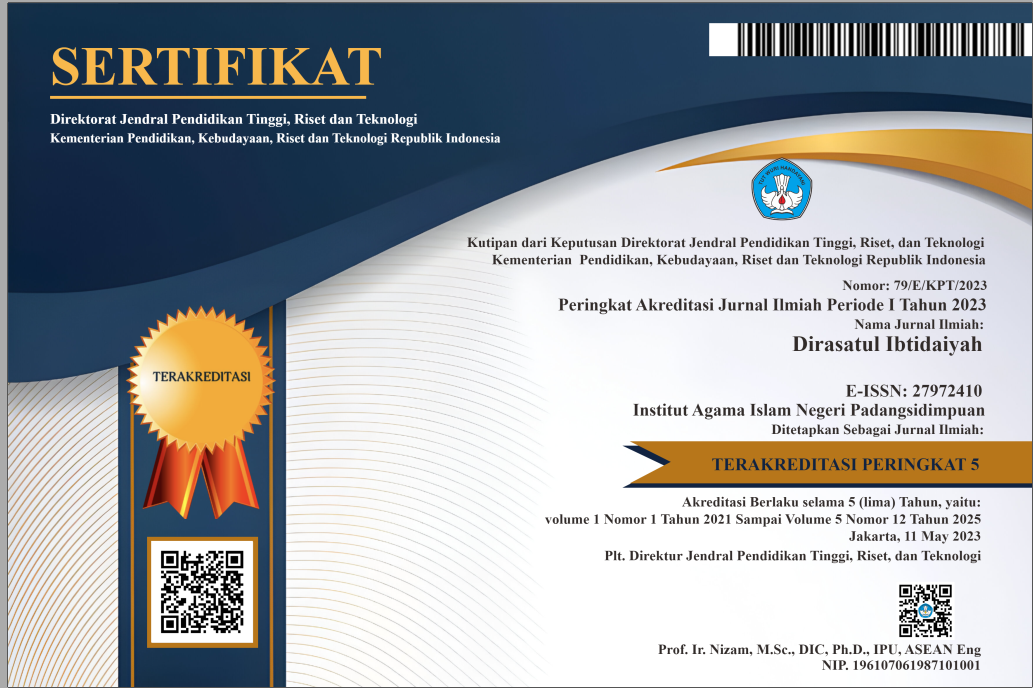PENGARUH PENERAPAN BLENDED LEARNING DAN PENGUASAAN TEKNOLOGI INFORMASI GURU TERHADAP MINAT BELAJAR KELOMPOK ILMU PENDIDIKAN AGAMA ISLAM
Abstract
This research is motivated by the interest in learning in the Islamic Religious Education science group of students. In theory, one of the developments in student interest in learning is influenced by factors that come from within the student. Likewise the development of interest in studying the Islamic Religious Education science group expected by teachers at Madrasah Aliyah Negeri (MAN) 1 Panyabungan. This study aims to determine the effect of applying blended learning, mastery of teacher information technology and the influence of both on interest in learning in the Islamic Religious Education study group, then differences in learning outcomes based on the application of blended learning and based on teacher information technology mastery. This type of research is quantitative research using the Ex post facto method. The population in this study were all students of Madrasah Aliyah Negeri (MAN) 1 Panyabungan, totaling 1186 people. The research sample was 119 people. The research results show that there is a correlation between X1 and Y. The value of rcount > rtable is 0.993 > 0.1801 with a significance level of 5%. so that H0 is rejected and Ha is accepted. R2 of 0.98 = 98.7%. The regression equation is Ŷ = 6.676 + 0.998X, the value of Fcount (8602.931) > Ftable (3.92), then Ho is rejected and Ha is accepted. It is known that there is a correlation between X2 and Y. The value of rcount > rtable is 0.957 > 0.1801 with a significance level of 5%, so H0 is rejected and Ha is accepted. R2 of 0.916 = 91.6%. The regression equation is Ŷ = 16.346 + 1.104 X, Fcount (1276.217) > Ftable (3.92), then Ho is rejected and Ha is accepted. The results of the multiple correlation calculations show that Ŷ = 6.652 + 0.898 X1 + 0.120X2, the value of Fcount (4602.149) > Ftable (3.92), then Ho is rejected and Ha is accepted, with a significance value of 5%. R2 = 0.9942 = 0.988 = 98.8%. For the t test and the significance of differences in students' interest in learning based on the application of blended learning obtained tcount 128.977 > ttable 1.657. So it can be concluded that Ho is rejected, Ha is accepted. and based on the teacher's mastery of information technology obtained tcount 123.306 > ttable 1.657, so it can be concluded that Ho is rejected Ha is accepted. With a significance level of 0.000 <0.05.
Keywords: Application of Blended learning and Mastery of Teacher Information Technology; Interest in Learning
Full Text:
PDFReferences
Abd Haris. 2019. Inovasi Belajar & Pembelajaran PAI (Inovatif Dan Aplikatif). Surabaya: UM Surabaya publishing.
Afi Parnawi. 2019. Psikologi Belajar. Yogyakarta: Deepublish.
Agung Yudi Sartono. 2023. “Meningkatkan Minat Dan Hasil Belajar Ekonomi Menggunakan Aplikasi E-Learning Madrasah Materi Badan Usaha Pada Siswa Kelas X IPS 1 Madrasah Aliyah Negeri 1 Kota Tangerang Selatan Tahun Pelajaran 2020-2021.” Jurnal Kajian Pendidikan Vol. 5, No. 1.
Ahmad Yani. 2010. Pahami Menjadi Teknisi Komputer. Bandung: Agromedia Pustaka.
Asfiati. 2020. Visualisasi Dan Virtualisasi Pembelajaran Pendidikan Agama Islam Versi Program Merdeka Belajar Dalam Tiga Era (Revolusi Industri 5.0, Era Pandemi Covid-19, Dan Era New Normal). Jakarta: Kencana.
Dayat Suryana. 2012. Mengenal Teknologi , 2012) Hlm. 20. Jakarta: Createspace Independent PUB.
Dhanty Susanti. 2017. Hubungan Antara Persepsi Tentang Kesehatan Lingkungan Sekolah Dan Sikap Terhadap Otoritas Guru Dengan Minat Belajar Siswa. Surakarta: Pasca Sarjana Universitas Muhammadiyah.
Dina Alfiana Ikhwani. 2021. Pembelajaran Efektif Masa Pandemi Covid-19. (Bandung: Media Sains Indonesia.
Feby Ingriyani. 2019. “Minat Belajar Mahasiswa Dengan Menggunakan Blended Learning Melalui Google Classroom Pada Pembelajaran Konsep Dasar Bahasa Indonesia SD.” Jurnal Ilmu Pendidikan, Keguruan Dan Pembelajaran Vol. 3, No. 1.
Hadion Wijoyo. 2021. Efektivitas Proses Pembelajaran Di Masa Pandemi. Solok: Insan Cendekia Mandiri.
Iwan Hermawan. 2019. Metodologi Penelitian Pendidikan Kuantitatif, Kualitatif Dan Mixed Methode. Jakarta: Hidayatul Quran Kuningan.
Izuddin Syarif. 2012. “Pengaruh Model Blended Learning Terhadap Motivasi Dan Prestasi Belajar Siswa SMK.” Vol. 2, Nomor.2.
M. Muis. 2020. Model Pembelajaran Berdasarkan Masalah: Teori Dan Penerapannya. Gresik Jawa Timur: Caremedia Communication.
Nizwardi Jalinus. 2020. Buku Model Flipped Blended Learning. Jawa Tengah: Sarnu Untung.
Novita Ahmad. 2020. “Pengaruh Pemanfaatan Teknologi Informasi Terhadap Minat Belajar Siswa SMA Negeri 1 Ampana Kota Sulawesi Tengah”, ”, , July 2020.” Jurnal Jambura Economic Education Journal Volume 2, No. 2.
Nur Zamidar. 2022. “Pengaruh Penggunaan Media Pembelajaran Quizizz Terhadap Minat Belajar Siswa Pada Mata Pelajaran ”, Skripsi, 2022, Hlm.63.” Ekonomi Di Sma Negeri 4 Banda Aceh.
Pakpahan, andrew fernando. 2021. Metodologi Penelitian Ilmiah. Yayasan Kita Menulis.
Rusli. 2009. Teknologi Dan Informasi Dalam Pendidikan. Jakarta: Gaung Persada.
Suardi. 2018. Belajar & Pembelajaran. Yogyakarta: Deepublish.
Sumadi Suryabrata. n.d. Psikologi Pendidikan. Jakarta: Rajawali Pers.
Syifa Fauziah. 2020. “Pengaruh E-Learning Edmodo Dengan Model Blended Learning Terhadap Minat Belajar, Jurnal Kependidikan, Volume 4, Nomor 1, 2020, Hlm. 123.” Jurnal Kependidikan Volume 4, Nomor 1.
Tim Pengembangan Ilmu Pendidikan FIP-UPI. 2007. Ilmu Dan Aplikasi Pendidikan. Jakarta: imtima.
DOI: https://doi.org/10.24952/ibtidaiyah.v3i1.9901
Refbacks
- There are currently no refbacks.

This work is licensed under a Creative Commons Attribution 4.0 International License.
ALAMAT JURNAL:
Program Studi Pendidikan Guru Madrasah Ibtidaiyah
Fakultas Tarbiyah dan Ilmu Keguruan
Universitas Islam Negeri Syekh Ali Hasan Ahmad Addary Padangsidimpuan
Jln. T. Rizal Nurdin Km 4,5 Sihitang Kampus Utama Universitas Islam Negeri Syekh Ali Hasan Ahmad Addary Padangsidimpuan 22733
e-mail: dirasatulibtidaiyah@uinsyahada.ac.id
P-ISSN: 2797-4588 E-ISSN: 2797-2410
Web journal: http://jurnal.iain-padangsidimpuan.ac.id/index.php/IBTIDAIYAH/index
Statistic Of Dirasatul Ibtidaiyah

.png)








